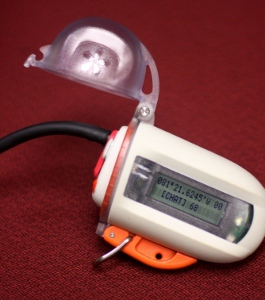Local firm donates marine radios to DoE divers
 (CNS): A local company which is supplying diver safety equipment donated two marine radios to the DoE this week. Bradley Johnson, a research officer with the department said that diving in the winter months to monitor the Nassau Grouper spawning aggregations is always challenging because of strong winds and rough seas. With much of the data there collected at sunset divers are surfacing just before dark and the units will help the DoE researchers communicate directly with the boat and direct them to their positions reducing the dangers associated with this type of diving.
(CNS): A local company which is supplying diver safety equipment donated two marine radios to the DoE this week. Bradley Johnson, a research officer with the department said that diving in the winter months to monitor the Nassau Grouper spawning aggregations is always challenging because of strong winds and rough seas. With much of the data there collected at sunset divers are surfacing just before dark and the units will help the DoE researchers communicate directly with the boat and direct them to their positions reducing the dangers associated with this type of diving.
Mike Lever, the inventor of the Lifeline said some 13,000 units have been sold to divers, boaters and other water sport enthusiasts over the last 13 months.
“Every week we receive stories of more divers who were able to call for help fast before their situation became a full blown emergency,” he said.
The Lifeline is a marine radio with a distress button that broadcast a diver’s position using digital selective calling to marine radios. The units can receive DSC messages and the casing is waterproof to 425 feet making it ideal for most recreational and technical scuba divers.
“It’s small, compact design makes it ideal for kite boarders, paddle boarders, jet-skiers, kayakers and anyone else who participates in water sports. On the surface, while using the radio, the unit is splash proof and a fully charged battery will ensure 30 minutes of talk time and 24 hours of emergency distress transmissions,” Lever added.
The lifeline is being distributed in the Cayman Islands, via Cayman Solar Solutions Ltd, owner Gary Redfern said the DoE needed the units to help divers who are working hard to preserve the marine environment and night diving on the spawning aggregations is a perfect application of the Nautilus Lifeline unit. “The Nautilus Lifeline is not just for 'extreme' diving; it will be equally useful during regular dives and activities, when you're caught in a current, when the engine on your jet ski dies or where you get separated from your paddle or kite board,” he said.
Redfern, an avid scuba diver and former sea rescue volunteer, has spent the last 2 weeks spreading the word about the new product. “The response has been impressive; it is already stocked in Divers Supply and Divers World, and a number of the dive operators are working through the logistics of being able to rent the units to their guests. I have also had informative meetings where I have introduced the units to the RCIPS's Joint Marine Unit and to the security staff at the Port Authority,” he added.
Category: Science and Nature

